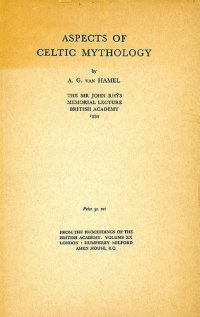
Ebook: Aspects of Celtic Mythology
Author: Anton Gerard van Hamel
- Genre: Religion
- Series: Proceedings of the British Academy 20. The Sir John Rhŷs Memorial Lectures
- Year: 1935
- Publisher: Humphrey Milford
- City: London
- Language: English
- pdf
Read 14 November 1934.
Some scholars look upon a myth as an article of faith of pagan times. Others take it as an expression of the early religious mind in a symbolical form. However, neither dogmatism nor speculation belongs to the primitive properties of religion. Their influence, great though it may become in the course of evolution, is not in any degree underrated if precedence is given to an altogether different aspect of mythology, which is of a practical and, therefore, a more primitive character. Myths have an essential bearing upon the execution of the earliest religious functions, that is, upon the ritual intended for the obtaining of a gift or favour from a superior power. Where a god is worshipped, the myth is there to remind him of what he has done or allowed on a previous occasion. At a more primitive stage some fictitious story of the past is recited so that fate, or whatever friendly or hostile powers might be involved, may react in accordance with the precedent. Whenever a supernatural force is raised by means of magic from a particular individual, the means resorted to is, again, the invocation of a sublime parallel. In this connexion myths appear in the introductory episodes of charms and incantations. These prefatory stories, where as a rule gods or demons are the agents, serve as an incentive to action, addressed to the powers invoked. Here we grasp the myth in its original significance, as we know it from the Anglo-Saxon charms and from those of the German Merseburg MS.
Some scholars look upon a myth as an article of faith of pagan times. Others take it as an expression of the early religious mind in a symbolical form. However, neither dogmatism nor speculation belongs to the primitive properties of religion. Their influence, great though it may become in the course of evolution, is not in any degree underrated if precedence is given to an altogether different aspect of mythology, which is of a practical and, therefore, a more primitive character. Myths have an essential bearing upon the execution of the earliest religious functions, that is, upon the ritual intended for the obtaining of a gift or favour from a superior power. Where a god is worshipped, the myth is there to remind him of what he has done or allowed on a previous occasion. At a more primitive stage some fictitious story of the past is recited so that fate, or whatever friendly or hostile powers might be involved, may react in accordance with the precedent. Whenever a supernatural force is raised by means of magic from a particular individual, the means resorted to is, again, the invocation of a sublime parallel. In this connexion myths appear in the introductory episodes of charms and incantations. These prefatory stories, where as a rule gods or demons are the agents, serve as an incentive to action, addressed to the powers invoked. Here we grasp the myth in its original significance, as we know it from the Anglo-Saxon charms and from those of the German Merseburg MS.
Download the book Aspects of Celtic Mythology for free or read online
Continue reading on any device:

Last viewed books
Related books
{related-news}
Comments (0)